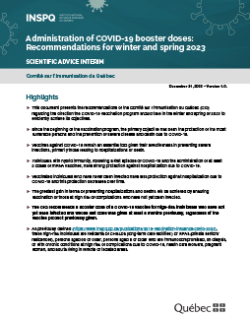Administration of COVID-19 booster doses: Recommendations for winter and spring 2023
- This document presents the recommendations of the Comité sur l'immunisation du Québec (CIQ) regarding the direction the COVID-19 vaccination program should take in the winter and spring of 2023 to efficiently achieve its objectives.
- Since the beginning of the vaccination program, the primary objective has been the protection of the most vulnerable persons and the prevention of severe disease and death due to COVID-19.
- Vaccines against COVID-19 remain an essential tool given their effectiveness in preventing severe infections, primarily those leading to hospitalizations or death.
- Individuals with hybrid immunity, following a first episode of COVID-19 and the administration of at least 2 doses of mRNA vaccines, have strong protection against hospitalization due to COVID-19.
- Vaccinated individuals who have never been infected have less protection against hospitalization due to COVID-19 and this protection decreases over time.
- The greatest gain in terms of preventing hospitalizations and deaths will be achieved by ensuring vaccination of those at high risk of complications who have not yet been infected.
- The CIQ recommends a booster dose of a COVID-19 vaccine for high-risk individuals who have not yet been infected and whose last dose was given at least 6 months previously, regardless of the vaccine product previously given.
- As previously defined (https://www.inspq.qc.ca/publications/3219-vaccination-influenza-covid-2022), these high-risk individuals are residents of CHSLDs (long-term care facilities ) or RPAs (private seniors’ residences), persons aged 60 or older, persons aged 5 or older who are immunocompromised, on dialysis, or with chronic conditions at high risk of complications due to COVID-19, health care workers, pregnant women, and adults living in remote or isolated areas.


